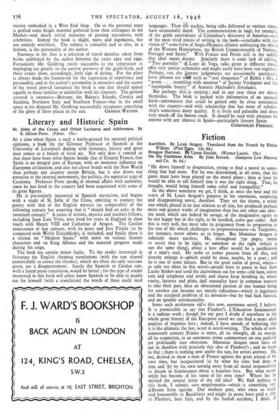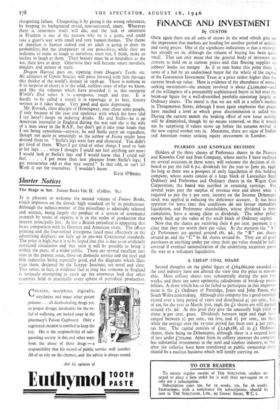Fiction
Aurelien. By Louis Aragon. Translated from the French by Eithne Wilkins. (Pilot Russ. 12s. 6d.)
Dragon Harvest. Iff Upton Sinclair. (Werner Laurie. 15s.)
and Co. 8s. 6d.)
"HE drove himself to desperation, trying to find a moral in some- thing that had none. For he was determined, at all costs, that the game must have been played on the moral plane ; then at least he would be able to tell-himself that it was the right thing. That, he thought, would bring himself some relief and tranquillity." In the above sentences we get, I think, at once the bear and the worst of M. Louis Aragon's purpose in his enormous, surprising and disappointing novel, Aurelien. They set the theme, a tricky one which, placed in its just relation to all else, has produced perhaps more and greater works of imagination than has any other one idea: the need, which can indeed be savage, of the imaginative egoist to be not happy but in the right, to be justified, coate que coate. And this is very well, but must take its poignancy from its proportion to the rest of life which challenges its preposterousness—as Turgeniev, for instance, never allows us to forget. But Monsieur Aragon is infinitely more careless. He, throughout 750 pages, seems to assert that to be right, or somehow in the right (which is not the same thing), about a love affair would be a justification of a man's soul. He seeks •to isolate passion from all else, and thereby enlarge it7imarhich could be done, maybe, by a poet and he is one of some stature. But in the great realm of prose,. where- as only too often in this novel—people have to pause to buy their Lucky Strikes-and send the charwoman out for some cold ham, where rain and telephone and stocks and shares keep breaking in, where vanity, laziness and plain, dull sensuality have in common honesty to take their part, then an obsessional passion of one human being for another can become not merely ridiculous—which is legitimate and the accepted problem of its inventor—but by bad luck farcical, and an ignoble sentimentality.
Some such misfortune rides this new, enormous novel, I believe. It is permissible to say that Flaubert's L'Education Sentimental,: is a tedious work ; thotigh for my part I doubt if anywhere in the whole great history Ol.the European novel we can find a more adult analysis of hopeless love ; indeed, I have moods of believing that it is the ultimate, the last, ward in novel-writing. The whole of mid- nineteenth century , France is there, all its thought, all its energy, all its scepticism, as an enormous ironic commentary on one pathetic yet profoundly true obsession. Monsieur Aragon must have set out in Aurelien with precisely this idea of Flaubert's ; and no harm in that ; there is nothing new under the sun, for artists anyway. He, too, desired to show a man of France against the great screen of his own time, but incapacitated (a) by what his time had done to him and (b) by his own turning away from all moral responsibility to dream in hopelessness about a hopeless love. But what mean- while has become of his sense of his own time? Where has he mislaid the central irony of the old idea? We find nothing in this book, I submit, save megalomania—which is something very different from egoism. Our modern poet, who owes so much and honourably to Baudelaire and might in prose have paid a debt to Flaubert, here fails, and by the foolish accident, I think, of
cheapening failure. Cheapening it by giving it the wrong references, by keeping its background trivial, non-universal, smart. Wherever there is smartness truth will die, and the lack of striartness in Flaubert is one of the reasons why he is a giant, and could take a giant's way with small and very human themes. The theme of Aurelien is human indeed and no adult is going to deny its probability; but the interpretert of our prose-lives, while they are welcome to make us laugh at ourselves, must not, I think, make us incline to laugh at them. Their bounty must be as boundless as the sea, their love as deep. Otherwise they will become smart novelists, maulers and petters of truth.
Dragon Harvest goes on, ripening from Dragon's Teeth, etc. All admirers of Upton Sinclair will press forward with him througn this thicket of the world's despair in 1938-40. There is nothing in it to surprise or cheer; it is the solid, ruthless story of what we know, and like the volumes which have preceded it in this energetic World's End series it is courageous, tough and true. It is hardly to be called a novel; it is reportage at its best, history written as it takes shape. Very good and quite depressing. Mr. Kovack, close disciple of Hemingway, may cheer some people, if only because of the ease and opulence with which his hero (did I say hero?) keeps on ordering drinks. He and Stella—he is an American journalist in England during the war and she is the wife of a man away in the R.A.F., but don't get it into your heads that I am being censorious--anyway, he and Stella carry on regardless, though not quite as amusingly as the author of Fiesta might have desired them to. " Stella's legs were lazy and elemental. You didn't get tired of them. When I got tired of other things I used to look at her legs. . . . when I thought I could not feel anything any more I would look at Stella's legs and I would know that I could still feel I got more than just pleasure from Stella's legs; I got reassurance odd as that may sound." Is that odd, or isn't it? Work it out for yourselves. I wouldn't know.
KATE O'BRIEN.



























 Previous page
Previous page